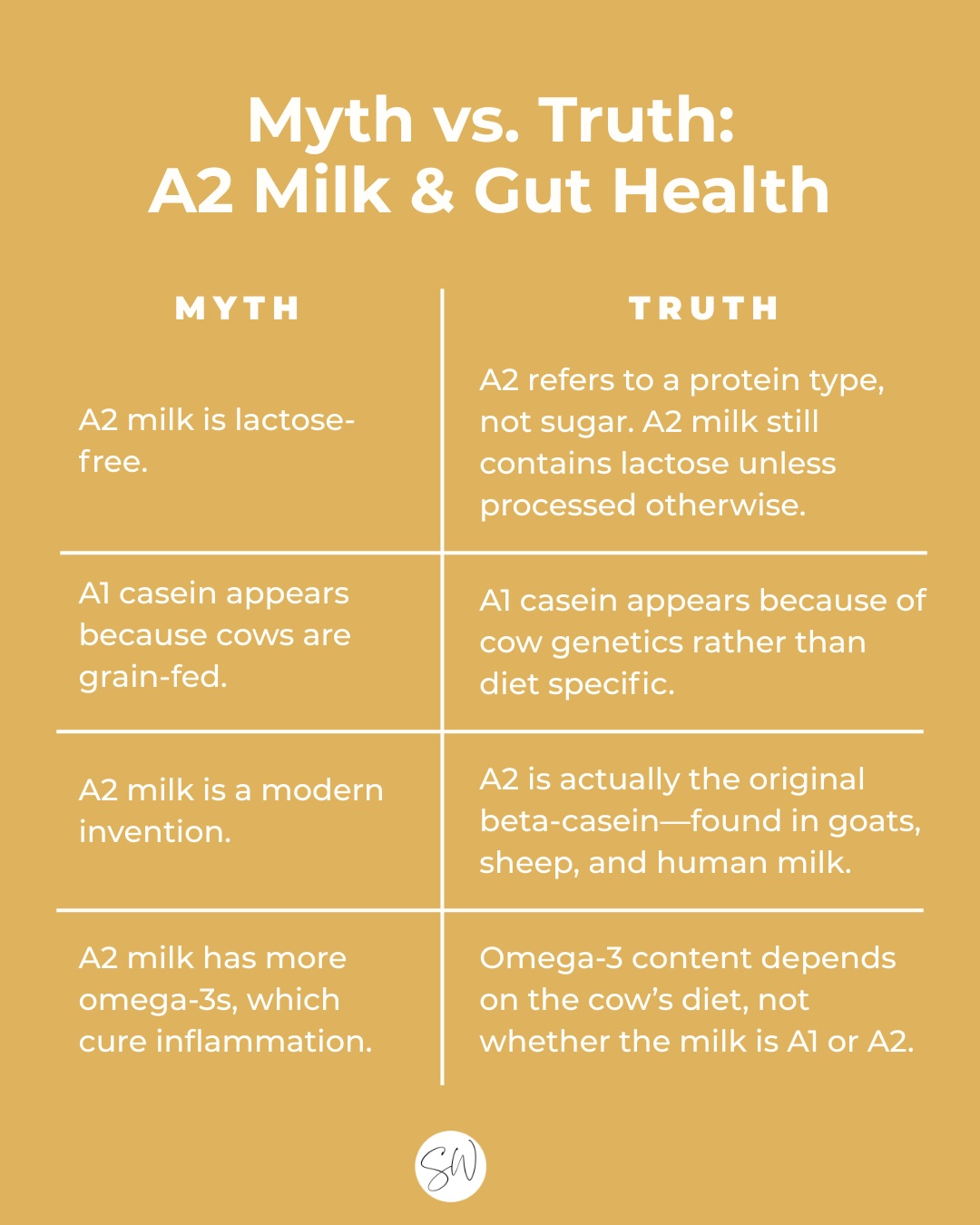Written by Ashlee Romine (future Registered Dietitian) | Reviewed by Sammy Peterson (Registered Dietitian)

If regular milk makes your stomach hurt, lactose may not be the culprit. Let me break it down.
Lactose is a sugar found in dairy products, and different dairy products contain varying amounts of lactose. When dairy is fermented, like in yogurt or cheese, the microbes digest the sugars and produce a sour, fermented taste. That’s why it’s important to choose cheeses aged for 3–6 months; this aging allows time for full fermentation. Similarly, finding yogurt that is truly fermented can be tricky, but often you’ll see probiotics listed in the ingredient label, which is a good sign.
If you find you can handle cheese and yogurt but not milk, you might be sensitive to lactose.
But some people react to all types of dairy—milk, cheese, yogurt, kefir, everything.
This is often due to sensitivity to the proteins in milk. Milk contains many proteins, but the two primary ones are whey (about 20%) and casein (about 80%). Some people are more sensitive to whey, others to casein.
To explain casein further, casein is the building block of milk and plays a major role in forming cheese. There are four main types of casein:
- Alpha-S1 casein: the most common casein type in cow’s milk
- Alpha-S2 casein: present in smaller amounts
- Beta-casein: includes the famous A1 and A2 variants, which are the center of much debate
- Kappa-casein: keeps the other caseins from clumping too soon until cheese-making begins
Now, let’s dive deeper into the A1 vs. A2 casein story:
A1 beta-casein is most commonly found in cow’s milk. It originated from a natural genetic mutation in European dairy cows thousands of years ago. This mutation changed one amino acid from proline to histidine, which is a small but significant change that affects how the protein is digested.
During digestion, A1 beta-casein can lead to the release of a peptide called BCM-7, which is thought to be linked to some digestive or inflammatory responses in sensitive individuals.
A2 beta-casein, on the other hand, is found in older cow breeds that still carry the original gene. Interestingly, goat, sheep, and even human milk contain only A2 beta-casein. A2 beta-casein does not produce BCM-7, which can cause gut discomfort, bloating, and gas.
Some human studies have shown that people who experience discomfort with regular milk often have fewer symptoms when consuming A2 milk. Smaller studies also suggest reduced inflammation markers or improved gut transit time with A2 compared to A1. However, research is still emerging, and everyone tolerates milk differently.
Since A2 beta-casein is more similar to the protein in human breast milk, it’s reasonable to assume it may be easier to digest—but remember, some people have sensitivities to lactose, whey, or alpha-casein regardless. The best approach is to try different dairy options and listen to your body.

Myth-Busting Section:
❌ Myth #1: A2 milk is lactose-free
✅ Truth: Lactose is a sugar, while A2 refers to a type of protein (beta-casein) in milk. They are not the same. The only way to remove lactose is through fermentation or lactose extraction.
❌ Myth #2: A1 casein only appears in milk because cows are grain-fed
✅ Truth: The A1 vs. A2 difference is due to cow genetics, not diet. The mutation happened naturally thousands of years ago. While many high-yield dairy breeds like Holsteins (often grain-fed) carry the A1 gene, diet does not create the gene.
❌ Myth #3: A2 milk is a modern invention
✅ Truth: A2 is actually the original form of beta-casein, found in older cow breeds, goats, sheep, and even human breast milk.
❌ Myth #4: A2 milk cures inflammation and gut issues because it contains more omega-3s
✅ Truth: A2 milk is not automatically higher in omega-3 fatty acids. The A2 label refers only to the casein protein type, not fat content or quality. Omega-3 levels depend largely on the cow’s diet. Grass-fed cows produce milk with higher omega-3s and a better omega-6:omega-3 ratio, which can reduce inflammation.
Thinking about trying A2 milk?
Have you avoided cow’s milk for years but are starting to wonder if it might actually work for you now? I get it, I was that person too 🙋🏼♀️. All through college, I swore by oat and almond milk because I thought they were the healthier choice. Now? I’m in my raw milk is a superfood era, and loving it.
It’s not that plant-based milks are bad, but cow’s milk has gotten a bad rap for a long time, and it’s finally starting to make a comeback in the wellness world. The truth is: we’re all different, and our bodies respond differently to dairy.
That’s why at Simply Wellness, we offer DNA testing to help you understand exactly how your body processes lactose. No more guessing, no more trial and error—just personalized insights to help you feel energized, less bloated, and confident in your food choices.
Ready to get to the root of your inflammation and start feeling like yourself again? Let’s figure out what works best for your body, together.